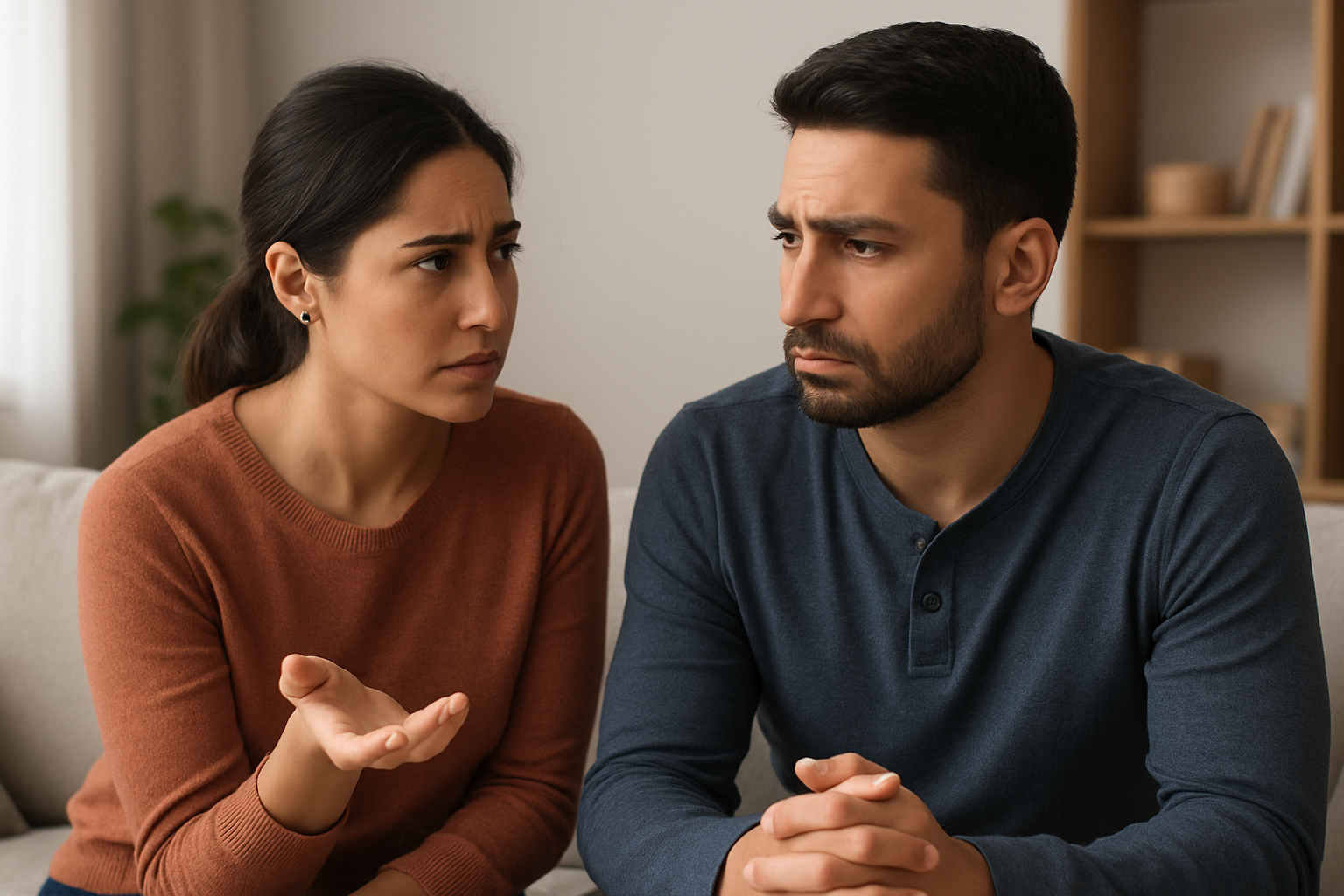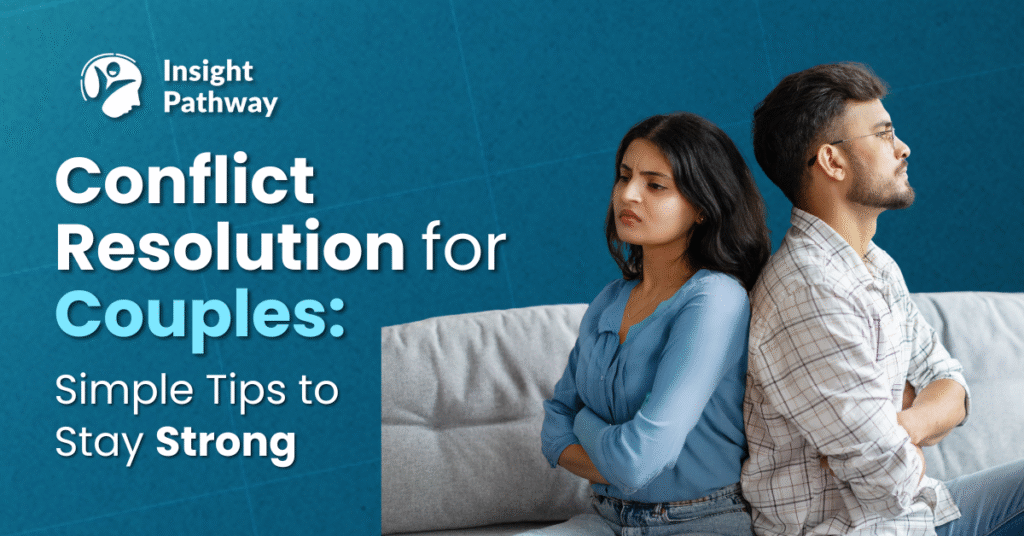No matter how strong your bond is, disagreements are a natural part of any relationship. Couples argue about everything from who’s doing the dishes to more complex issues like emotional disconnect or financial decisions. Sometimes, conflicts stem from underlying issues,such as feeling unheard, overwhelmed, or insecure. Add to that the stress of daily life, long working hours, or external family pressure, and even the most connected couples can feel the tension rise.
Still, conflict doesn’t mean a relationship is broken. In fact, working through disagreements the right way often strengthens the relationship. According to experts in conflict resolution for couples, disagreements can deepen understanding, build trust, and improve emotional intimacy,if handled with care.

Why Do Couples Fight?
Before diving into solutions, it’s helpful to understand common reasons behind conflict. Some of the most frequent triggers include:
- Communication gaps
- Unmet emotional or physical needs
- Stress related to finances or careers
- Mismatched expectations
- Lack of appreciation or recognition
- Infidelity or trust issues
- Feeling emotionally distant or disconnected
Many of these issues don’t stem from malice but from misunderstanding or accumulated resentment. Over time, small issues left unspoken can grow into major rifts. That’s why learning conflict resolution for couples is essential to stop issues from getting worse.
1. Speak Openly, Not Through Signals
One of the biggest mistakes couples make is assuming the other person should know what’s wrong. A partner might act moody, distant, or irritated, expecting their partner to “get the hint.” But indirect signals often lead to confusion and defensiveness.
Instead, practice open and honest communication. Express what’s on your mind calmly and clearly. This not only prevents unnecessary misunderstandings but also shows emotional maturity a key trait in any healthy relationship.
For example, rather than saying, “You don’t care about me anymore,” try, “Lately, I’ve been feeling distant and would love to spend more time together.” The tone, intent, and impact are very different.
2. Focus on Feelings, Not Fault
Blame is a quick way to turn a small disagreement into a full-blown argument. When someone feels attacked, they often close off or get defensive. The goal in any conflict should be to resolve, not to win.
Using “I” statements is a strong way to express yourself clearly and respectfully. Instead of accusing your partner with “You never listen,” try “I feel unheard when I talk and don’t get a response.” This approach avoids finger-pointing while still expressing your feelings.
This strategy is central to effective conflict resolution for couples and helps protect the emotional safety within the relationship.
3. Don’t Mix Old Fights with New Ones
It’s tempting to bring up past mistakes during a new argument, but doing so muddies the waters. If every disagreement turns into a history lesson of unresolved issues, it becomes almost impossible to resolve anything.
To keep arguments productive, stick to the issue at hand. This makes conversations shorter, clearer, and more effective.
If older wounds still hurt, it’s better to schedule a time to discuss them separately or consider couple therapy, where a relationship counsellor can guide you both through past hurts constructively.
4. Make Listening Your Superpower
Communication isn’t just about talking, it’s equally about listening. And not just hearing words, but really understanding the meaning behind them.
When your partner shares their feelings, pause. Don’t interrupt. Avoid jumping in with solutions or rebuttals. Sometimes, the act of listening deeply is more powerful than any solution.
Ask follow-up questions to show you’re engaged:
“What did you mean when you said you felt alone?”
“Can you explain what you meant when you said you were feeling alone?”
This type of active listening shows emotional intelligence and builds the base of every healthy relationship.
5. Choose Curiosity Over Ego
Conflicts often escalate because one or both partners get stuck in being “right.” But relationships aren’t a debate to be won, they’re a connection to be nurtured.
Being curious about your partner’s perspective rather than trying to defeat it opens the door to empathy and compromise. Ask yourself: “What is my partner feeling right now?” rather than “How do I prove my point?”
By keeping your ego in check, you’re more likely to resolve the issue in a way that benefits both of you, true conflict resolution for couples isn’t about victory, but understanding.
6. Learn to Pause When Needed
Not every fight needs to be resolved immediately. Sometimes, walking away to cool off is the smartest move. If emotions are too high, continuing the argument can lead to saying things you don’t mean, or even emotional damage.
Take a short break and revisit the conversation later when both of you are calmer and more rational. Saying “I want to talk about this, but I need 10 minutes to breathe first” shows respect and emotional regulation, two qualities that sustain a healthy relationship.
7. When It’s Time to Ask for Help
Even with your best efforts, some issues might feel too heavy to tackle alone. That’s okay. It doesn’t mean your relationship is failing, it means you care enough to fix it.
If conflicts are frequent, unresolved, or emotionally exhausting, seeking help from a professional relationship counsellor can make a real difference. Through couple therapy, you’ll learn tools for better communication, emotional awareness, and mutual support.
Therapy can also help if one or both of you is feeling chronically depressed, emotionally disconnected, or stuck in repetitive patterns of blame or withdrawal.
A safe and supportive space, guided by a professional, can bring clarity and direction where conversations once felt impossible.
Why Couple Therapy Works
Couple therapy isn’t just for couples on the verge of breakup. It’s also for those who want to deepen their emotional connection, repair trust, or improve communication.
A qualified relationship counsellor helps you both identify core issues, such as attachment styles, emotional needs, and unresolved trauma. Many people aren’t aware of how their past relationships or family dynamics affect their current behavior, therapy helps bridge that gap.
And in cases where a partner is feeling persistently depressed or withdrawn, therapy becomes even more crucial. Emotional health is directly tied to relational health. Addressing both helps couples create a more loving, resilient partnership.
Final Thoughts
Every couple faces moments of friction,but it’s how those moments are handled that makes all the difference. When approached with care, communication, and emotional honesty, conflict can actually strengthen your connection rather than weaken it.
By embracing conflict resolution for couples, you’re not just solving a problem, you’re investing in the long-term health of your relationship.
And remember, if things feel too tough to navigate alone, there’s no shame in reaching out. Whether you’re looking for emotional support, structured guidance, or simply a space to reconnect, a relationship counsellor or expert in couple therapy can help you move forward with clarity and compassion.
If you’re feeling overwhelmed or just want to reconnect on a deeper level, explore trusted platforms like Insight pathway, where certified experts are ready to support your journey toward a healthy relationship.

